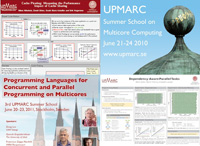Data-driven Sensor Network Macroprogramming using ATaG
- Speaker
Animesh Pathak
 , from INRIA
, from INRIA
- Date and Time
Tuesday, October 20th, 2009 at 13.30
- Location
Polacksbaken, room 1146
- Abstract
-
Wireless Sensor Networks (WSNs) have emerged as a new class of distributed pervasive systems, with applications in a diverse range of domains such as traffic management, building environment management, target tracking, etc. Most, if not all, WSN application design is currently performed at the node-level, with developers manually customizing various protocols to realize their applications. This makes it difficult for the typical domain-expert (e.g., a building system designer) to develop applications for them, and is a hindrance to their wide acceptance. To address this problem, the field of macroprogramming has emerged, which aims to provide high-level programming abstractions to assist in application development for WSNs. Although several macroprogramming approaches have been studied, the area of compilation of these macroprograms to node-level code is still largely unexplored.
In this talk, I will address the issues involved in the specification and compilation of sensor network macroprograms. The emphasis will be on data-driven macroprogramming using Abstract Task Graphs (ATaG), where the application is represented as a set of tasks running on the system´s nodes - producing, processing and acting on data items or streams to achieve the system´s goals. I will present a modular framework for the compilation of data-driven macroprograms that breaks down the process of converting the high-level specification to node-level functionality into a set of independent procedures such as optimizing the placement of functionality on the real nodes, or predicting communication costs. A formal model for task-mapping problem which arises in this context, and provide mixed-integer programming formulations for two commonly used WSN optimization goals - minimizing the total energy spent in the system, and energy balance will also be provided. In addition to the above, fast algorithmic heuristics for task mapping will be discussed, along with extensions of our techniques to cases when multiple paths are possible between the nodes in the sensor network. Finally, I will present the details of Srijan - a graphical toolkit for sensor network macroprogramming which targets the SUN SPOT WSN nodes.




